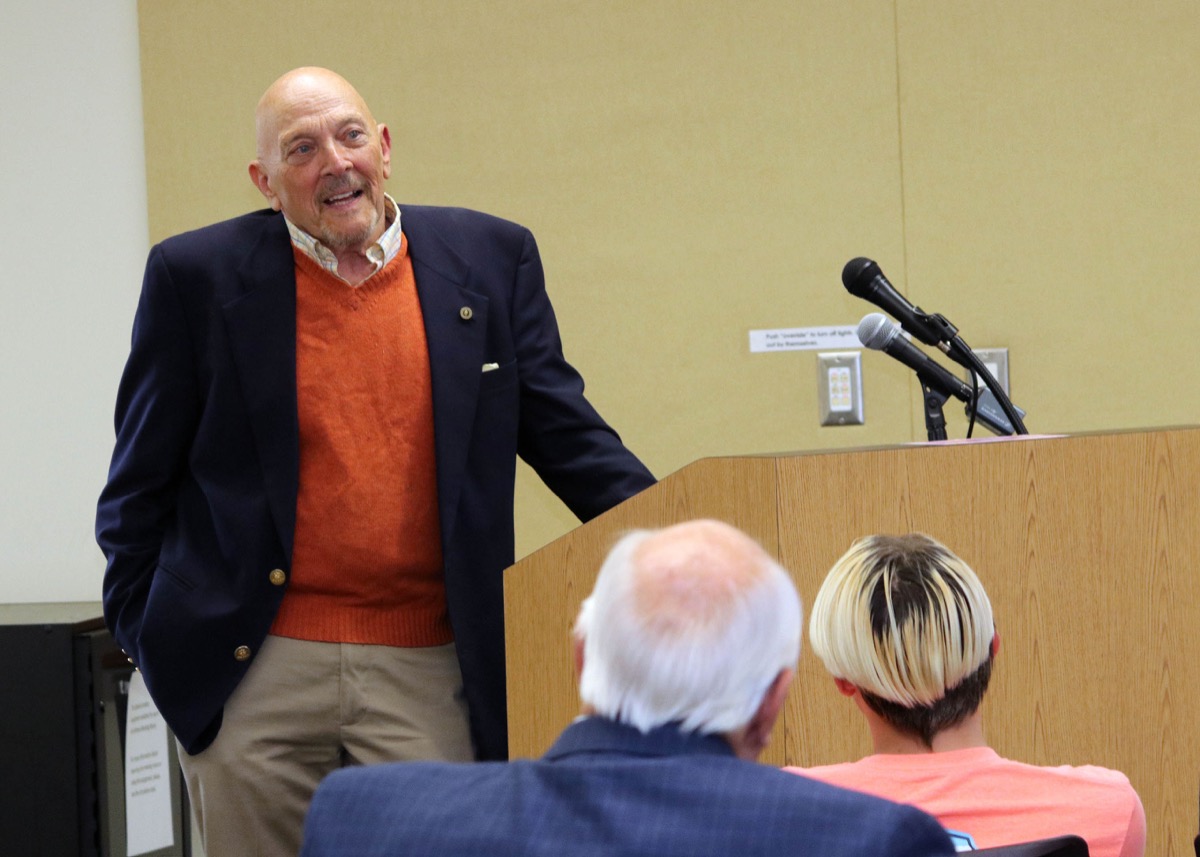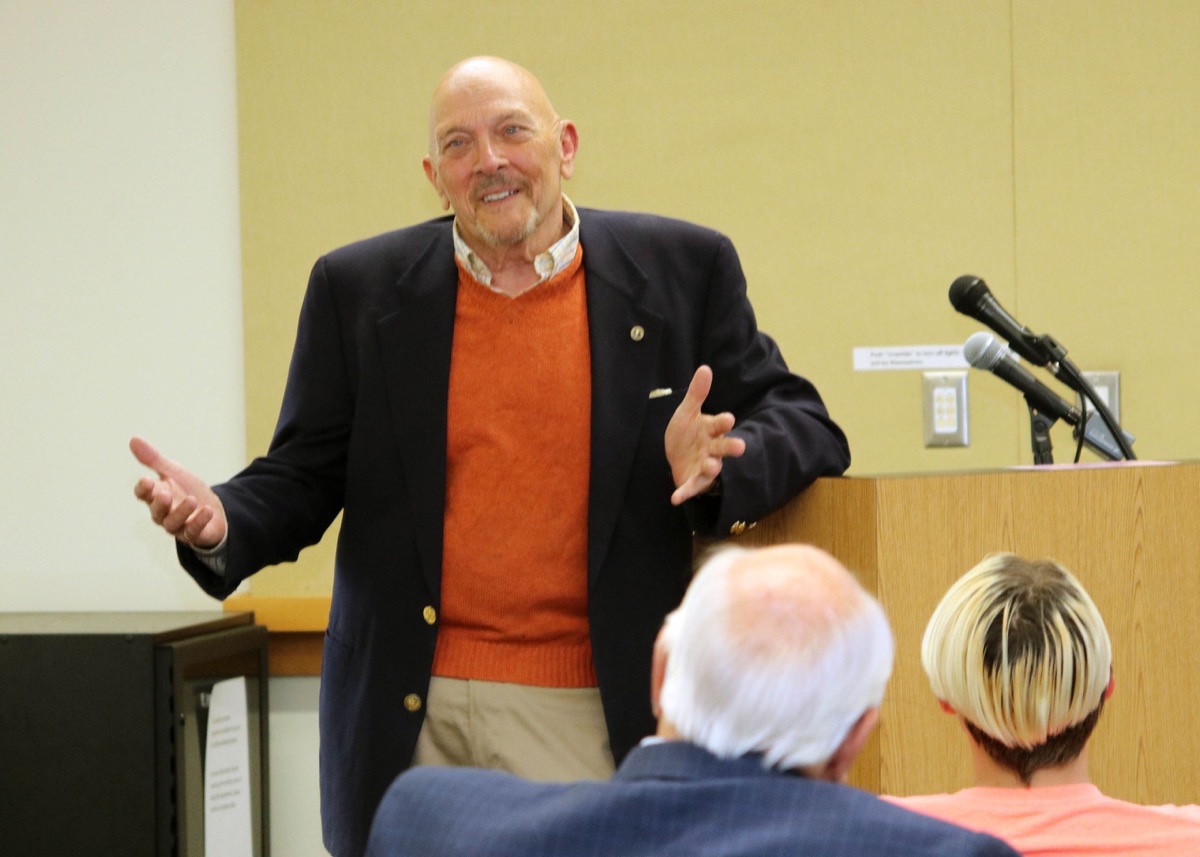College News
Dr. John Shelton Reed visits CCCC to speak about BBQ

click image to enlarge ⊗
Dr. John Shelton Reed spoke about 'The History and Culture of Barbecue' during a public lecture held ... (more)
11.24.2023 • College & Community • College General
PITTSBORO, N.C. - Few things spark an argument as quickly in this state as the mere mention of barbecue. Eastern or western. Tomato or no tomato. Rub or no rub. Does grilling even count? And that doesn't even touch some of those fiery interstate disputes. Dry ribs or wet. Mustard or white sauce. Beef brisket or, heaven forbid, mutton!
Southern culture scholar Dr. John Shelton Reed carefully sorted through it all in "The History and Culture of Barbecue," a public lecture held Nov. 15 at Chatham Community Library and organized by Central Carolina Community College.
Reed isn't some run-of-the-mill speaker. He has a deep resume that begins with an undergraduate degree from the Massachusetts Institute of Technology, his doctorate from Columbia University and tenure as the William Rand Kenan Jr. Professor of Sociology at the University of North Carolina at Chapel Hill. He is a founder of the university's acclaimed Center for the Study of the American South and even received the state's highest civilian honor, the Order of the Long Leaf Pine.
He's lectured around the world on a long list of topics, but most important to this audience is pig (and all of the sides that go with it). Reed is author of several books on his topic of the day, including one of the canonical texts: "Holy Smoke: The Big Book of North Carolina Barbecue."
Even the word "barbecue" isn't as straightforward as it may seem. Does it refer to a cooking technique: the "low and slow" process of preparing meat? Yes. But what about an occasion: the big "family barbecue"? Yes, again. And what about the meat itself; after all, everyone in this state has heard of "chopped barbecue." That's a thing, too, but it gets even more complicated, because some meats become barbecue only when they're bathed in a sauce.
Throughout his presentation, Reed unraveled the complexity, illustrating his points with graphic examples from his research and writing. Some of them were striking.
When discussing barbecue as an occasion, he pointed to photos from exactly one century ago -- a political gathering for Oklahoma Gov. Jack Walton, whose barbecue required one mile of cooking pits and 19 rail cars of wood to feed about 100,000 people. And the menu wasn't just the pork, beef and chicken so common today. There was a menagerie of meat: sheep, deer, duck, goose, rabbit, possum, reindeer and squirrel. Even three bears and one antelope.
In the end, Reed said, it wasn't all that successful. Walton was the first governor in state history to be removed from office.
That tradition continues today in North Carolina with the Mallard Creek Presbyterian Church Barbecue, still held every fourth Thursday in October after more than 90 years. That gathering in Charlotte, Reed said, was intentionally scheduled just before election day so politicians could rally support, though it's more of a generic community event now, raising money to fund church outreach and facility debt.
Much of Reed's presentation focused on more familiar topics, like how North Carolina's favorite styles emerged: whole hog barbecue with vinegar sauce, no tomato, down east and pork shoulder, with tomato in the sauce, farther west. As well as how ethnic tastes shaped what we now know as barbecue -- for example, how cooks with a German heritage brought mustard-based sauce into the mix in South Carolina and introduced mutton, sheep barbecue with a "black dip" sauce, in Kentucky.
Nothing about barbecue has ever been stagnant. As the idea moved across the country, Reed said, barbecue adapted to new meats, different cultural tastes and even new ways of approaching traditional styles.
Which brought the scholar to where barbecue is headed now.
Though intensely local and driven by individual barbecue cookers, chain restaurants are becoming more popular, most of them spreading a Texas style of beef brisket to other areas of the country. Reed said he likes just about every style of barbecue -- in its place -- and that certainly includes Texas-style barbecue in Texas.
And Reed also pointed to what he calls the "chefification" of barbecue, the trend to elevate a food created by and for the average person into a more high-end dining experience, complete with valet parking and wine lists. He gave several examples, like Fette Sau in Brooklyn, N.Y., and Pitt Cue in London, places he likes, but shift traditional understandings of what barbecue is at its core.
In a similar vein, barbecue is increasingly influenced by what Reed calls "neo-traditionalists." Restauranteurs at the whole-hog restaurant Picnic in Durham and James Beard Award winner and author Aaron Franklin, who focuses on brisket in Austin, Texas, are taking traditional food and methods, but trying to make them the best they can be.
Reed never set out to become one of the world's experts in barbecue; it just emerged naturally from his cultural examination of the American South. His recent research and writing have shifted a bit -- his upcoming book takes a close look at the Ramos Gin Fizz, a notable New Orleans cocktail that Reed describes as "a foamy, key lime pie milkshake" -- but he will never lose his cultural and culinary fascination with barbecue.
In fact, he's still actively involved in promoting the traditional North Carolina style as part of The Campaign for Real Barbecue, based on website at TrueCue.org, that celebrates roughly 70 restaurants statewide still dedicated to preparing wood-cooked barbecue made with pork shoulder, Boston butt, hams or whole hog. For Reed, that is what's truly authentic.
Early in the question-and-answer session following his presentation came the inevitable question: What are his favorite North Carolina barbecue restaurants? And Reed replied quickly with a list of maybe eight or 10 that included some of the legendary joints: B's Barbecue in Greenville, Skylight Inn BBQ in Ayden, Bridges Barbecue Lodge in Shelby and The Barbecue Center, among others, in Lexington.
Then someone asked what was the worst. Reed paused for a moment. Then he slowly repeated the question before looking toward the ceiling, apparently in thought. After pausing yet again, he rendered a verdict: "There are so many."
Categories
- Admin, Faculty & Staff Category
- Arts & Entertainment Category
- Clubs Category
- College & Community Category
- College General Category
- Continuing Education Category
- Curriculum Programs Category
- Distance Education Programs Category
- Facilities/Buildings Category
- Finances Category
- Foundation Category
- Graduations Category
- Lee Early College Category
- NCCCS Category
- SGA Category
- Special Events Category
- Sports Category
- Students/Graduates Category
- Uncategorized Category
Archives


